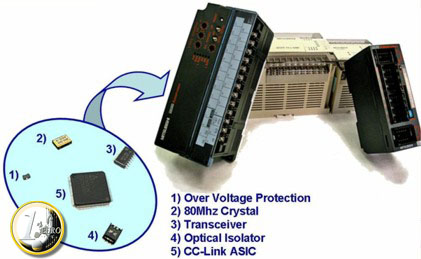
Any manufacturer considering which fieldbus standards to support will look to balance two major considerations: the value of the potential business of supporting any given fieldbus; and the effort required to support that fieldbus. And, clearly, if the potential business outweighs the costs of development then the case for support is proven.
In the case of supporting the CC-Link protocol, the case is overwhelming. The potential business is massive, as CC-Link is the dominant fieldbus standard in fast-growing Asian markets and is growing fast in both Europe and North America. And the development effort is not as daunting as one might think as much of the the functionality resides in a single application specific integrated circuit (ASIC) that handles the complete datalink layer and transport layer for reliable communications and assures interoperability between devices.
This low-cost ASIC is readily available from member company Mitsubishi Electric Corporation. This leaves the equipment manufacturer to focus on the application layer of the interface design, where device-level interface profiles and electronic CC-Link System Profile (CSP) files are available from the CC-Link Partner Association to assure interoperability at the application layer. Further design help and guidance through the process of conformance testing is also available through the CC-Link Partner Association. So, with the fieldbus interface effectively provided by a single chip, there is little to stop manufacturers from designing CC-Link capable products and tapping in to the vast market offered by this growing market.
Download free CC-Link Compatible Product Development Guidebook (PDF 2mb)
Balluff case study: From initial idea to certified product in just six months




